Designing my life, part one: Building a compass
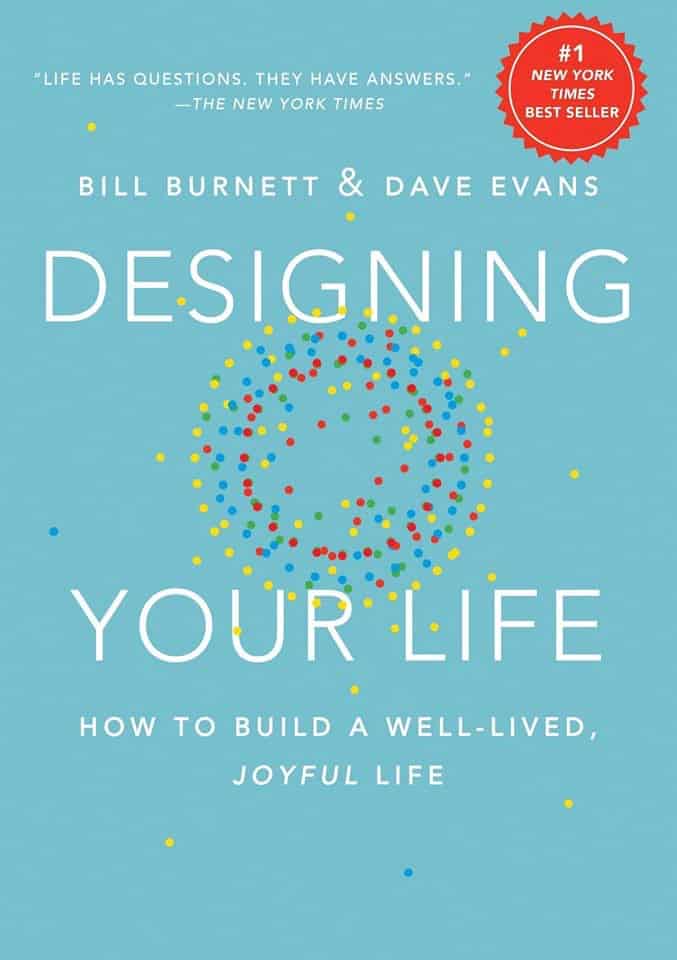
After advocating Designing Your Life to several friends, two of them suggested that we work through the book's exercises together. One of those friends is Kim, my long-term girlfriend. The other is Craig, a college classmate. I thought it might be fun to share some of these exercises as we complete them over the next couple of months.
Because I want to respect the intellectual property of the authors, I'm not going to describe the exercises exactly. Instead, I'll provide a vague overview and then discuss my own answers. (And, when it makes sense, I'll also include answers from my friends.)
How to make better decisions
Howdy, friends. Sorry for the long lapse between posts. After returning from a brief summer vacation, the GRS database had imploded. Again. We patched things up this morning and can now resume publishing. Over the next couple of weeks, I plan to share excerpts from three recent money books.
The following is from Buy This, Not That by Sam Dogen with permission from Portfolio, an imprint of the Penguin Publishing Group, a division of Penguin Random House LLC. Copyright © 2022 by Kansei Incorporated.
Please note that I've edited this passage slightly to (a) be more readable on the web and (b) fit within the publisher's word-count limitations. Ready? Let's dive in!<
The seven habits of highly effective people
Because I've been driving back and forth from Corvallis to Portland so much lately to attend to my mother and cousin, I've had ample to time to listen to audiobooks. I find that I'm actually grateful for the opportunity to "read" in this fashion. (Like many folks, the past decade has destroyed my attention span and ability to read for long periods.)
I'm currently reading Stephen R. Covey's classic The Seven Habits of Highly Effective People. (Five stars on Amazon in 5672 reviews!) I read the book once long, long ago — sometime during the mid-1990s. I've referred to it now and then as the years have gone by, but mostly I've forgotten its lessons. Continue reading...
The seven deadly sins of personal finance
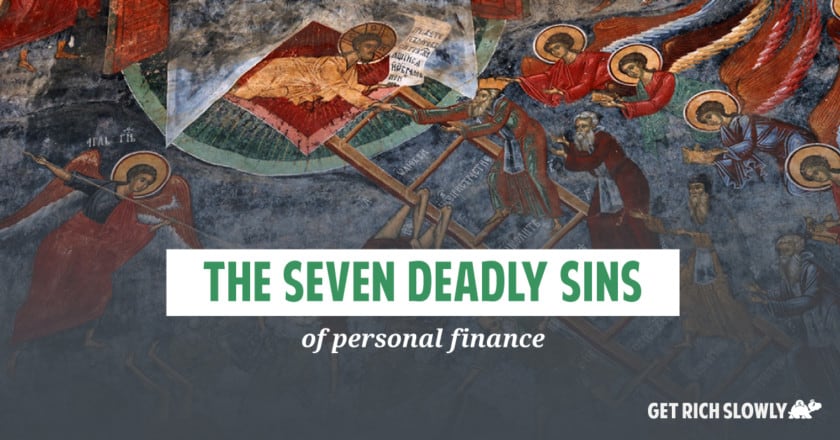
I've been reading and writing about personal finance for more than thirteen years. In that time, I've consumed a lot of books about money. Lately, I've found that it's fun to revisit old favorites.
Recently, for instance, I've been re-reading Brett Wilder's The Quiet Millionaire [my review]. It's different than most personal finance books. It's targeted at those who are farther along their financial journeys rather than at those just starting out. Still, there are bits and pieces in The Quiet Millionaire that are applicable to everyone.
Ten years ago, I wrote that I particularly like Wilder's list of the seven enemies to financial success (which is my phrase, not his). I still like them. He writes:
Book review: I Will Teach You to Be Rich (2019 Edition)
When I started Get Rich Slowly in 2006, I had no idea other money blogs existed. I'd been blogging about cats, computers, and comic books since 1997 -- before blog was even a word! -- and I thought my new venture might be the first blog about personal finance.
I was wrong.
I learned quickly that there were already dozens (dozens!) of people blogging about money on the interwebs. For instance:
What is money for? An evening with Vicki Robin
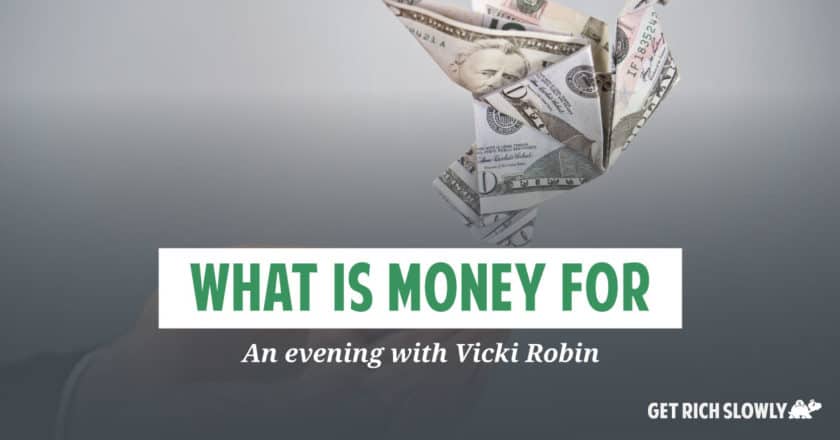
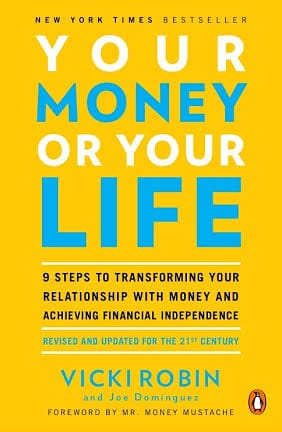
As an adult, my heroes are more mundane. They're the people who make personal finance accessible to average people. Long-time readers know that billionaire investor Warren Buffett is one of my heroes. So too is Dave Ramsey, who has helped countless people -- including me -- get out of debt.
But perhaps my biggest hero is an unassuming 73-year-old woman in cat-eye glasses who lives on Whidbey Island in Washington's Puget Sound.
Book review: Work Optional by Tanja Hester
Last week, I published an extended excerpt from Grant Sabatier's new book, Financial Freedom. Sabatier's core message is that time is more valuable than money — and that freedom is more valuable than time.
Several GRS readers took issue with the book's seemingly anti-work tone.
- "There is a lot of talk about the drudgery of work; [I'm] pretty lucky [that] I love my job and have a lot of autonomy," wrote Angelica.
- S.G. said, "The 'wage slave' rhetoric gets old."
- And our pal El Nerdo didn't like this sentence: "I retired early because I didn’t want to spend the best years of my life working in a poorly lit cubicle at a stressful job I didn’t particularly enjoy." El Nerdo's response? "Could you maybe just find a better job? One that you enjoyed? With no cubicles, and better light?"
These comments are telling. They're representative of a common complaint leveled against the FIRE movement. (As you probably know, FIRE is a clumsy acronym for "financial independence/retire early". The FIRE movement is all about saving enough to retire as soon as you can.)
<Financial freedom and the value of time
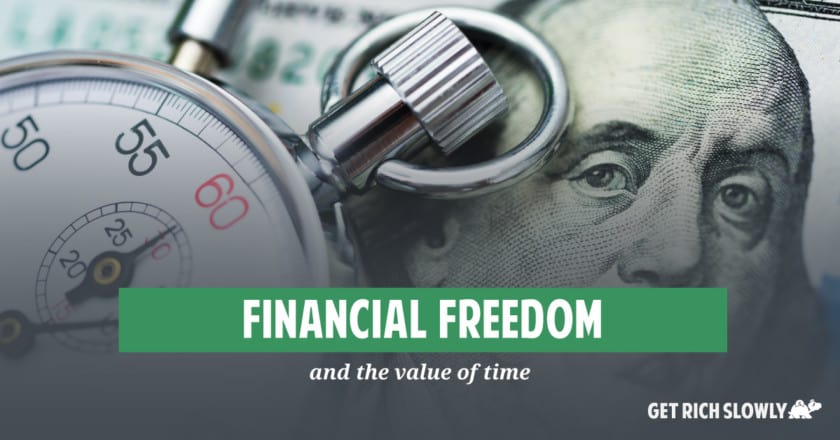
Note from J.D.
Last October, I had a chance to read an advance copy of Grant Sabatier's new book, Financial Freedom, which was just released this morning. I liked it. I loved parts of it. In fact, the second chapter of Financial Freedom inspired my article about how time is more valuable than money.Today, I'm pleased to present a (heavily edited) excerpt from that second chapter. Here's Sabatier on why time is more valuable than money -- and why you can and should retire early. (Links and photos are from me. Everything else is from the book. Note, however, I've heavily edited this chapter in order to abridge it and to make it more readable in blog format.)
If some ninety-year-old rich dude offered you $100 million to trade places with him, would you do it? Of course not. Why? Because time is more valuable than money.
My experience with the KonMari method (and the life-changing magic of tidying up)

Because I'm a money nerd and a comics nerd, one of my favorite things is when these two obsessions come together in the form of (drom roll, please): financial graphic novels!
You might think that's a niche I just invented, but you'd be wrong. I'll admit that financial graphic novels aren't common, but they are out there. I've written before about the comics adaptation of Studs Terkel's Working, for instance. But I also own comic book versions of Think and Grow Rich, The Long Tail, The Alchemist, and Robert Caldini's Influence.
My dream project? Collaborating with an artist to create a visual version of my A Brief Guide to Financial Freedom.
An index to every money book I’ve reviewed during the past twelve years
I read a lot of money books. As a result, a large section of my large library is devoted to books about personal finance. (And if I hadn't purged hundreds of money books when I sold this site in 2009, I'd have even more books -- and no place to put them.)
Last week, a GRS reader named Lindsay dropped a line with an interesting question:
"I'm really enjoying your work back at GRS, the email newsletter, and your most recent FB live video! I'm wondering: Do you have a list of all the money books you've reviewed? I've been poking around to try and find one)?"
![The Seven Habits of Highly Effective People [The Seven Habits of Highly Effective People book cover]](https://www.getrichslowly.org/wp-content/uploads/the-seven-habits-of-highly-effective-people.jpg)